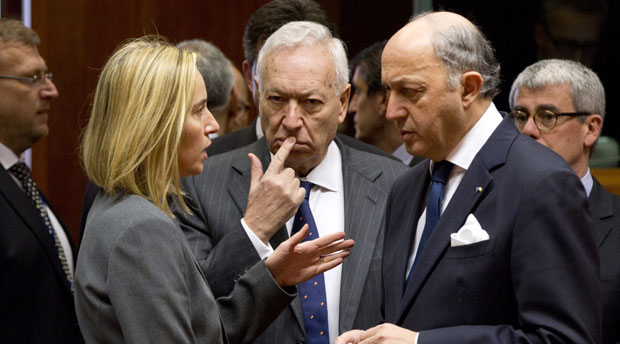Spanish foreign minister coming to sign new accord

Spanish Foreign Minister Jose Manuel Garcia-Margallo (center) speaks with Italian Foreign Minister Federica Mogherini and French Foreign Minister Laurent Fabius during an emergency meeting of EU foreign ministers at the EU Council building in Brussels on March 3, 2014. Garcia-Margallo will arrive in the Philippines March 23 for a visit and undertake official functions on March 24 and 25. AP
MANILA, Philippines—Spain’s top diplomat is set to visit the Philippines this month to forge a fresh development pact that would lay down Spanish support on governance reform and disaster risk reduction in the country, Spanish Ambassador to the Philippines Jorge Domecq said on Thursday.
The envoy told the Inquirer that José Manuel García-Margallo, Spain’s minister of foreign affairs and cooperation, will arrive in Manila for a three-day visit before the end of the month, his first trip to the country since assuming his post in 2011.
Domecq said Garcia-Margallo will arrive March 23 and undertake official functions on March 24 and 25, highlighted by political consultations and the signing of a new Cooperation Framework Agreement with the Philippine side.
Expected to “establish a new Spanish-Philippine partnership for the next four years, the document will be anchored on the long-standing Treaty of Friendship between the two countries,” Domecq said.
The treaty signaled the establishment of diplomatic links between Spain and the Philippines in 1947, some 49 years after the end of Spanish occupation of more than three centuries here.
Article continues after this advertisementThe new cooperation pact will lay down Spain’s development program in the Philippines, focusing on support for governance reform and disaster risk reduction, the envoy said.
Article continues after this advertisement“It’s important. It’s the first time for this foreign minister [to visit here]. The main reason of his visit is several reasons: It’s right after Tacloban, [he’ll] see what is being done, and also to hold the political consultations,” said Domecq in an interview following his speech on Spain’s development program before a group of Filipino property developers in Makati City.
Spain and the Philippines hold these consultations every three or so years, alternately in Manila and Madrid, said Domecq. The last round of consultations was held in Madrid in 2010.
During his visit, the Spanish foreign minister is expected to call on President Aquino, Domecq said.
Garcia-Margallo will also inaugurate the first emergency warehouse of the National Disaster Risk Reduction and Management Council at the Clark Freeport Zone in Pampanga, the first of six planned by the Philippine government, the envoy said.
The logistics base, supported by funding from the Spanish aid agency, is envisioned to “provide immediate logistical support, “to store first-response relief supplies,” and to serve as emergency training centers for Philippine humanitarian workers, Domecq said.
The next warehouse is expected to be set up soon at Fort Magsaysay in Nueva Ecija with Spanish support, he said.
The Philippines is a major recipient of Spanish grant aid, receiving some 255 million euros (P15.8 billion) between 2001 and 2012, said Domecq.
Of this amount, Spain has funneled some 28 million euros in humanitarian aid to the Philippines since 2007, disbursing funds to support for relief efforts, including last year’s major emergencies: the Bohol earthquake, the conflict in Zamboanga, and Super Typhoon Yolanda.
As part of its sustained humanitarian support, Spain has committed to support the training of more provincial disaster response teams, inspired by the success of the Albay government’s rescue group. The disaster risk reduction and response system in Albay, among the country’s most hazard-prone provinces, has become a “national benchmark,” Domecq said.—Tarra Quismundo